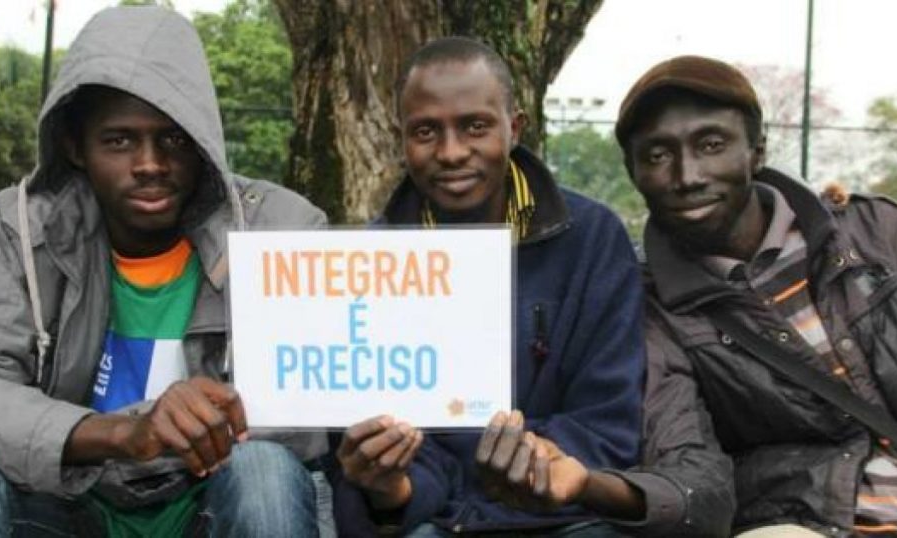Pablo Marlon Medeiros da Silva, Doctor in Business Administration at the Potiguar University (UnP). Natal, RN, Brazil.
Janaína Gularte Cardoso, Doctoral student in Administration at the Federal University of Santa Catarina. Florianópolis, SC, Brazil.
Gabriel Horn Iwaya, Doctoral student in Psychology at the Federal University of Santa Catarina. Florianópolis, SC, Brasil.
Brena Samara de Paula holds a degree in Accounting Sciences from the State University of Rio Grande do Norte. Natal, RN, Brazil.
Arthur William Pereira da Silva, Doctor in Business Administration at the Potiguar University (UnP). Natal, RN, Brazil.
Wanderson Fernandes Modesto de Oliveira, Doctoral student in Administration at the University Potiguar. Natal, RN, Brazil.
![]() The refugee crisis around the world has intensified global debates about the effective integration of refugees in host countries in recent years. In Brazil, the target of this study, Silva et al. (2020) estimate that more than 30,000 people, of the most diverse nationalities, are in a refugee situation.
The refugee crisis around the world has intensified global debates about the effective integration of refugees in host countries in recent years. In Brazil, the target of this study, Silva et al. (2020) estimate that more than 30,000 people, of the most diverse nationalities, are in a refugee situation.
To increase the chances of successful integration, employment is considered by the literature to be a key factor for the effective integration of refugees in the host country (AGER; STRANG, 2008; LEE et al., 2020). In the meantime, the issue is addressed under the aegis of the theory of the relational structure of diversity management by Syed and Özbilgin (2009), which argues that a greater probability of effective diversity management occurs when there is an alignment of structural, institutional supports and individual, involving the participation of all social actors in the integration of people in the work environment.
Thus, the article Barriers to refugee employment in Brazil and their impacts on long-term integration (Revista Brasileira de Estudos de População, vol. 39, pp. 1-24, 2022) aims to understand how individual, national and organizational barriers and their interrelationships impact the employment of refugees in the Brazilian labor market, based on the theory of the relational structure of diversity management by Syed and Özbilgin (2009).
In order to understand this issue, it presents a literature review that includes diversity management and the need for a multilevel look at its effectiveness, including individual, national and organizational aspects.
From a qualitative approach, the study reveals that macro-national, meso-organizational and micro-individual factors are interconnected and can affect diversity management programs implemented in Brazil in relation to refugees.

Image: Pepita Martin Ortega
It should be noted that the refugees were unanimous in saying that the language and the non-transfer of skills were the main individual obstacle they encountered upon arriving in Brazil. They also claim that there is xenophobic political rhetoric that intertwines with different social narratives, which can result in greater discrimination and fewer job opportunities.
At the organizational level, stereotypes shared between managers and members are one of the main factors of exclusion in the labor market, favoring a series of problems, such as prejudice, racism and discrimination.
Furthermore, the findings of this research indicated the prevalence of national barriers to the exclusion of refugees from work, and these can potentiate exclusion factors at an individual and organizational level.
Finally, the Brazilian government appeared as one of the main national obstacles to integration, playing a particularly important role in the relational structure.
References
DA SILVA, P.M.M., EL-AOUAR, W. A., SEVERO, E.A., BRITO, L.M.P and DE CASTRO, A.B.C. Integration of refugees involving organizational managers’ experiences. Cad. EBAPE.BR [online]. 2021, vol. 19, no. 2, pp. 338-352 [viewed 01 September 2022]. https://doi.org/10.1590/1679-395120200017 Available from: https://www.scielo.br/j/cebape/a/SRbG3PBmhRxQ5RDrgxCjpkD/?lang=en
DA SILVA, P.M.M. and EL-AOUAR, W. A., TELES FIRMINO, T., DE SOUSA, J. C. and DA SILVA, W. V. Contributions and challenges of voluntary organizations towards the integration of refugees into the job market. Equality, Diversity and Inclusion [online]. 2021, vol. 41, no. 4, pp. 608-623 [viewed 01 September 2022]. https://doi.org/10.1108/EDI-07-2020-0203. Available from: https://www.emerald.com/insight/content/doi/10.1108/EDI-07-2020-0203/full/html
DA SILVA, G. J., CAVALCANTI, L., OLIVEIRA, T. and MACEDO, M. Refúgio em números. 5. ed. Brasília: Observatório das Migrações Internacionais; Ministério da Justiça e Segurança Pública/Comitê Nacional para os Refugiados, 2020.
SYED, J. and ÖZBILGIN, M. A relational framework for international transfer of diversity management practices. The International Journal of Human Resource Management [online]. 2009, vol. 20, no. 12, pp. 2435-2453 [viewed 01 September 2022]. https://doi.org/10.1080/09585190903363755. Available from: https://www.tandfonline.com/doi/abs/10.1080/09585190903363755
SYED, J. and ÖZBILGIN, M. Managing diversity and inclusion: an international perspective. London: Sage, 2015.
To read the article, access
DA SILVA, P.M.M., et al. Barreiras ao emprego de refugiados no Brasil e seus impactos na integração de longo prazo. Revista Brasileira de Estudos de População [online]. 2022, vol. 39 [viewed 01 September 2022]. https://doi.org/10.20947/S0102-3098a0210. Available from: https://www.scielo.br/j/rbepop/a/6P3hmfryxSrPhPYMRvMx5pD/
External links
Perfis nas redes sociais da Rebep: Facebook | Twitter | Instagram
Como citar este post [ISO 690/2010]:


















Recent Comments